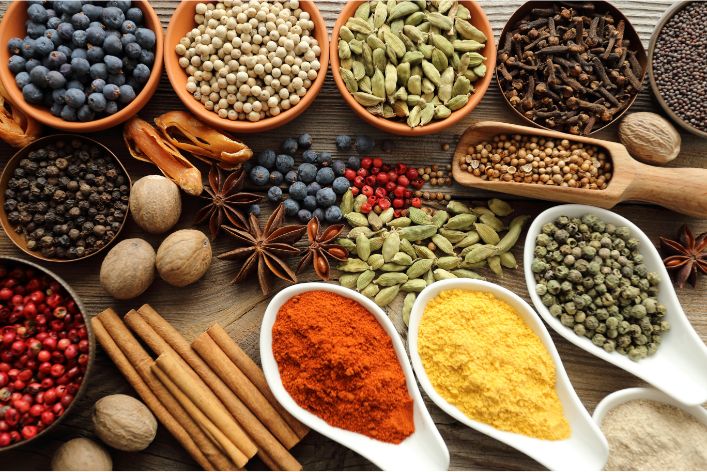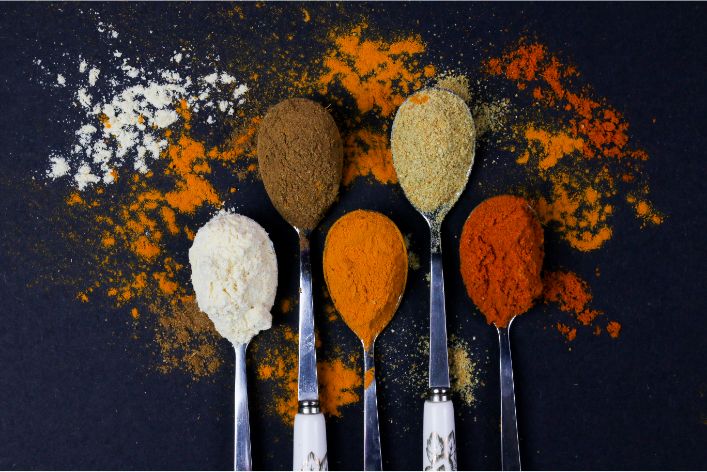Throughout history, spices have played a significant role in culinary and medicinal practices worldwide. With roots dating back to ancient civilizations, spices have been used to enhance flavor, preserve food, and treat various ailments. Spices continue to be essential in modern-day cooking, as they offer a multitude of health benefits. By incorporating spices into our meals, we can improve digestion, increase metabolism, and reduce the risk of chronic diseases.
For centuries, people have used spices in traditional medicine to bolster the immune and nervous systems, assist digestion, and alleviate pain. Ancient Egyptians used spices such as cinnamon and ginger for embalming and preserving mummies. Ayurvedic medicine, an ancient Indian health practice, uses spices to foster balance and wellness in the body. The Greeks and Romans also recognized the medicinal properties of various spices and used them to enhance their dishes.

Incorporating spices into our diets is essential for maintaining a healthy lifestyle. Many spices have natural anti-inflammatory properties which can help reduce the risk of chronic diseases such as arthritis, heart disease, and cancer. Research has shown that spices like turmeric, ginger, and garlic possess significant anti-cancer properties. Spices also have a positive impact on our digestive system, improving nutrient absorption and supporting healthy gut bacteria.
We cannot overstate the importance of integrating spices into our meals. The numerous health benefits and flavorful enhancements make spices an essential component of any culinary endeavor. From ancient times to modern-day practices, spices have been and continue to be an essential ingredient for cultural, culinary, and medicinal purposes.
Read: The Top 10 Superfoods You Need to Include in Your Diet
Health Benefits of Spices
Spices are the flavor of life, and they provide not just exquisite taste but also numerous health benefits. Scientific studies show that the antioxidant properties of spices protect against chronic diseases such as cancer, heart disease, and diabetes. From cinnamon to garlic, adding spices to your meals can boost your immunity and increase your longevity. Here’s a list of some common spices and their health benefits:
1. Turmeric
Curcumin, the active ingredient in turmeric, has potent anti-inflammatory and antioxidant properties. It’s been found to reduce the risk of heart disease, Alzheimer’s disease, and cancer.
2. Cinnamon
Cinnamon is a rich source of antioxidants and has been found to improve insulin sensitivity and lower blood sugar levels. It also has anti-inflammatory properties and may help reduce the risk of heart disease.
3. Garlic
Garlic contains a compound called allicin that has been found to have antibacterial, antiviral, and antifungal properties. It’s also been shown to lower blood pressure and cholesterol levels.
4. Ginger
Ginger has powerful anti-inflammatory properties and has been found to alleviate nausea, aid in digestion, and reduce muscle pain and soreness.
Read: Antioxidants in a Healthy Diet: What to Know
5. Rosemary
Rosemary is a rich source of antioxidants and has been found to protect against oxidative stress, which can lead to chronic diseases. It’s also been found to improve memory and concentration.
6. Oregano
Oregano is loaded with antioxidants and has been found to have antimicrobial properties. It’s also been found to improve digestion and reduce inflammation.
7. Black pepper
Black pepper contains a compound called piperine that has been found to increase the absorption of nutrients and improve digestion. It’s also been found to have anti-inflammatory properties and may help reduce the risk of cancer.
8. Cayenne pepper
Cayenne pepper contains capsaicin, a compound that has been found to increase metabolism and reduce appetite. It’s also been found to have anti-inflammatory properties and may help reduce the risk of cancer.
Incorporating spices into your meals is an easy way to boost your health and add flavor to your diet. Try adding turmeric to your scrambled eggs or smoothies, sprinkling cinnamon on your oatmeal or coffee, roasting garlic with your vegetables, grating ginger into your stir-fries, adding rosemary to your roasted chicken, sprinkling oregano on your pizza, and seasoning your salads with black pepper and cayenne pepper.
The bottom line is that spices not only make our foods taste better but also provide numerous health benefits. By incorporating a variety of spices into our diet, we can protect our bodies against chronic diseases, enhance our immune system, and increase our longevity. So, spice up your life and enjoy the delicious and healthy benefits of spices.
Read: Should You Switch to a Plant-Based Diet for Health Benefits?
How Spices Enhance Flavor
Spices have long been integral in many cuisines. They are known to add depth and complexity to dishes, often serving as a natural flavor enhancer. Depending on the region and culture, the types of spices used can differ greatly. Here, we will discuss the different types of spices and their flavor profiles, how they can complement and enhance the flavor of dishes, and provide examples of meals that are elevated with the addition of spices.
Cinnamon
Cinnamon is a sweet spice that can add warmth and depth to both sweet and savory dishes. It’s a common ingredient in Christmas cookies and baked goods, but it also pairs well with Middle Eastern and Moroccan dishes. Sprinkle cinnamon over roasted veggies, use it as a rub for meat, or add it to your morning cup of coffee.
Turmeric
Turmeric is a vibrant yellow spice that adds a unique flavor to dishes, often appearing in Indian and Southeast Asian cuisines. It has an earthy, slightly bitter taste with a subtle hint of sweetness. It pairs well with chicken, rice, roasted vegetables, and lentils. Turmeric is also praised for its health and anti-inflammatory benefits.
Cumin
Cumin is a versatile spice that can add a warm and smoky flavor to dishes. It’s commonly used in Mexican and Indian cuisine, as well as in traditional chili recipes. Cumin pairs well with grilled meats, stews, and adds a depth of flavor to vegetarian dishes.
Ginger
Ginger is a spicy and fragrant spice that can add a bright and zingy flavor to dishes. It’s a common ingredient in Asian cuisine, such as stir-fry dishes, but it also pairs well with seafood, vegetables, and fruit dishes. Ginger is also praised for its health benefits, such as aiding digestion and reducing inflammation.
Paprika
Paprika is a mild and sweet spice with a vibrant red color that adds both flavor and color to dishes. It’s a popular ingredient in Hungarian and Spanish cuisine, used in dishes such as goulash and paella. Paprika pairs well with roasted meats, grilled vegetables, and soups.
Spices can complement and enhance the flavor of dishes in numerous ways. Cinnamon, for example, can balance sweetness in baked goods and add warmth to savory dishes. Turmeric adds depth and color to rice dishes and curries. Cumin can add warmth and smokiness to chili and other stews. Ginger adds freshness and zing to Asian dishes and is often paired with garlic and chili. Paprika adds color and mild flavor to dishes.
Adding spices to a dish can elevate even the simplest of meals. For example, scrambled eggs become more flavorful with a pinch of cumin. Roasted chicken benefits from a sprinkle of paprika. And roasted vegetables become intriguingly complex with a dash of cinnamon. Spices can also help cut down on salt or sugar, allowing for more natural flavors to emerge in your dishes.
Spices are a vital component in many cuisines, adding depth, complexity, and flavor to dishes. Understanding the flavor profiles of different spices can help you create unique and flavorful dishes, and experimenting with them can lead to exciting new meals. Using spices to enhance your cooking is a simple way to elevate even the most basic of meals.
Read: How to Create a Balanced and Nutritious Meal Plan

Tips for Incorporating Spices
Are you tired of making bland and boring meals? Adding spices is an easy way to elevate the flavors of your dishes and make them more exciting. Here are some tips for incorporating spices into your cooking:
Offer Suggestions for Incorporating Spices Into Meals
- Use a variety of spices in your marinades and rubs for meat or vegetables.
- Add spices to your eggs, soups, and sauces for an extra kick.
- Create your own spice blends to use for specific dishes or cuisines.
Share Easy Recipes That Beginners Can Try Using Different Spices
Here are some simple recipes that beginners can try using different spices:
Spice-Rubbed Grilled Chicken
- 1 tsp paprika
- 1 tsp garlic powder
- 1 tsp onion powder
- 1 tsp salt
- 4 chicken breasts
Mix the spices together and rub onto the chicken breasts. Grill until cooked through.
Cumin-Spiced Roasted Carrots
- 1 tsp cumin
- 1 tsp salt
- 1/2 tsp black pepper
- 1/4 cup olive oil
- 1 lb carrots, peeled and chopped
Mix the spices and oil together and toss with the chopped carrots. Roast in the oven at 375°F for 25-30 minutes.
Discuss How to Balance Spice Flavors and Avoid Over-Seasoning
Adding too much spice can ruin a dish, so it’s important to know how to balance flavors. Here are some tips:
- Start with a small amount of spice and taste as you go.
- Remember that some spices are stronger than others (e.g. cayenne vs. paprika).
- Consider the other flavors in the dish and how the spices will complement or contrast them.
- Add acid (e.g. lemon juice) or sweetness (e.g. honey) to balance out too much spice.
By following these tips and experimenting with different spices, you can take your cooking to the next level and impress your family and friends with delicious and flavorful meals.
Read: 10 Easy and Delicious Meal Prep Ideas for a Busy Week
We Design & Develop Websites, Android & iOS Apps
Looking to transform your digital presence? We specialize in creating stunning websites and powerful mobile apps for Android and iOS. Let us bring your vision to life with innovative, tailored solutions!
Get Started TodayConclusion
Using spices in cooking adds a depth of flavor and a range of health benefits. Spices like turmeric, cumin, ginger, and cinnamon have anti-inflammatory properties and can aid in digestion.
Aside from health benefits, spices also add unique and delicious flavors to dishes. For example, adding coriander to a dish can give it a citrusy, tangy flavor, while adding smoked paprika can give it a smoky, savory taste.
While it can be easy to stick to the same spices and flavorings, challenging yourself to experiment with new ones can lead to exciting and delicious culinary discoveries. Try adding cardamom to your morning coffee or using sumac instead of lemon juice in your salad dressing.
Incorporating spices into your cooking not only makes your food more exciting and flavorful, but it also promotes a healthy diet full of anti-inflammatory and digestion-aiding properties. So next time you’re in the kitchen, don’t be afraid to spice things up!
Recap: Using spices in cooking enhances both the health benefits and flavor of dishes. Spices like turmeric, cumin, ginger, and cinnamon have anti-inflammatory properties and aid in digestion. Experiment with new spices to discover new flavors, like using coriander or smoked paprika. Incorporating spices into your diet promotes a healthy, flavorful lifestyle.
Read: How to Lower Your Blood Pressure Naturally
Before You Go…
Hey, thank you for reading this blog to the end. I hope it was helpful. Let me tell you a little bit about Nicholas Idoko Technologies. We help businesses and companies build an online presence by developing web, mobile, desktop, and blockchain applications.
We also help aspiring software developers and programmers learn the skills they need to have a successful career. Take your first step to becoming a programming boss by joining our Learn To Code academy today!
Be sure to contact us if you need more information or have any questions! We are readily available.
Put Your Tech Company on the Map!
Get featured on Nicholas Idoko’s Blog for just $200. Showcase your business, boost credibility, and reach a growing audience eager for tech solutions.
Publish Now










